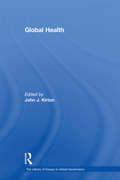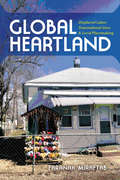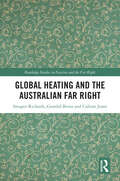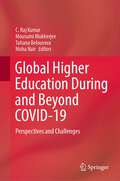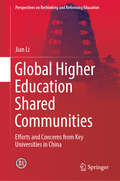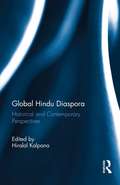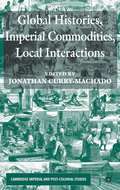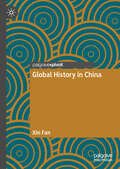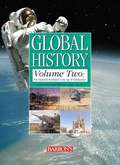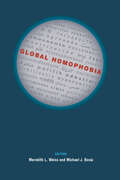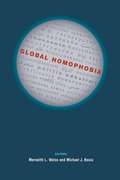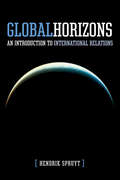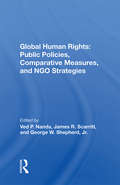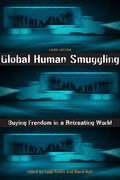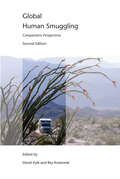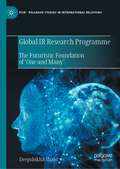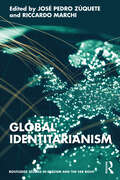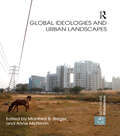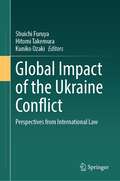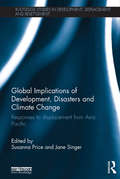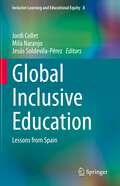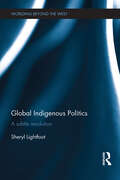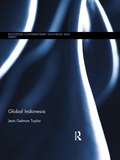- Table View
- List View
Global Health: Sovereignty, Mobility Of People And Healthcare Governance (The Library of Essays in Global Governance)
by John J. KirtonIn recent years, especially since the end of the cold war, the field of global health has become increasingly linked with and central to the more traditional concerns of international relations. The spread of communicable diseases, the challenge of migrating health workers and the development of new technologies and medicines have all contributed to the ever-expanding issue of global health. International organizations such as the World Health Organization, the utilization of techniques such as the creation of the framework convention on tobacco control and the development of civil society organizations such as the Gates Foundation, have all changed the face and framework of global health. Among the many benefits to the expanding interdisciplinary study of health is the possibility of preventing millions of unnecessary deaths occurring every year. By assembling from a wide array of disciplines and fields the central works that define the field in international relations today, this innovative work explores the future of global health and the possible benefits of expanding the interdisciplinary path even further.
Global Heartland
by Faranak MiraftabGlobal Heartland is the account of diverse, dispossessed, and displaced people brought together in a former sundown town in Illinois. Recruited to work in the local meat-processing plant, African Americans, Mexicans, and West Africans re-create the town in unexpected ways. Drawing on ethnographic research conducted in the US, Mexico, and Togo, Faranak Miraftab shows how this workforce is produced for the global labor market; how the displaced workers' transnational lives help them stay in these jobs; and how they negotiate their relationships with each other across the lines of ethnicity, race, language, and nationality as they make a new home. Beardstown is not an exception but an example of local-global connections that make for local development. Focusing on a locality in a non-metropolitan region, this work contributes to urban scholarship on globalization by offering a fresh perspective on politics and materialities of placemaking.
Global Heating and the Australian Far Right (Routledge Studies in Fascism and the Far Right)
by Imogen Richards Gearóid Brinn Callum JonesGlobal Heating and the Australian Far Right examines the environmental politics of far-right actors and movements in Australia, exploring their broader political context and responses to climate change. The book traces the development of far-right pseudo-environmentalism and territorial politics, from colonial genocide and Australian nationalism to extreme-right political violence. Through a critical analysis of news and social media, it reveals how denialist and resignatory attitudes towards climate change operate alongside extreme right accelerationism, in a wider Australian political context characterised by reactionary fossil fuel politics and neoliberal New Right climate change agendas. The authors scrutinise the manipulation of environmental politics by contemporary Australian far- and extreme-right actors in cross-national online media. They also assess the political-ideological context of the contemporary far right, addressing intergovernmental approaches to security threats connected to the far right and climate change, and the emergence of radical environmentalist traditions in ‘New Catastrophism’ literature. The conclusion synthesises key insights, analysing the mainstreaming of ethnonationalist and authoritarian responses to global heating, and potential future trajectories of far-right movements exploiting the climate crisis. It also emphasises the necessity for radical political alternatives to counter the far right’s exploitation of climate change. This book will be of interest to researchers of climate change, the far right, neoliberal capitalism, extremism and Australian politics.
Global Heating and the Australian Far Right (Routledge Studies in Fascism and the Far Right)
by Imogen Richards Gearóid Brinn Callum JonesGlobal Heating and the Australian Far Right examines the environmental politics of far-right actors and movements in Australia, exploring their broader political context and responses to climate change.The book traces the development of far-right pseudo-environmentalism and territorial politics, from colonial genocide and Australian nationalism to extreme-right political violence. Through a critical analysis of news and social media, it reveals how denialist and resignatory attitudes towards climate change operate alongside extreme right accelerationism, in a wider Australian political context characterised by reactionary fossil fuel politics and neoliberal New Right climate change agendas. The authors scrutinise the manipulation of environmental politics by contemporary Australian far- and extreme-right actors in cross-national online media. They also assess the political-ideological context of the contemporary far right, addressing intergovernmental approaches to security threats connected to the far right and climate change, and the emergence of radical environmentalist traditions in ‘New Catastrophism’ literature. The conclusion synthesises key insights, analysing the mainstreaming of ethnonationalist and authoritarian responses to global heating, and potential future trajectories of far-right movements exploiting the climate crisis. It also emphasises the necessity for radical political alternatives to counter the far right’s exploitation of climate change.This book will be of interest to researchers of climate change, the far right, neoliberal capitalism, extremism and Australian politics.
Global Higher Education During and Beyond COVID-19: Perspectives and Challenges
by Nisha Nair Mousumi Mukherjee C. Raj Kumar Tatiana BelousovaThis book offers insights into how higher educational institutions and educators have responded to the immense challenges of managing the COVID-19 pandemic. Written by global experts in the field of higher education, it offers a multidimensional overview of the digital transformation, governance, and social justice issues within higher education institutions during the pandemic. It provides theoretical insights and conceptual analysis of the emerging trends in global higher education, the challenges, and possible ways to address them to shape more sustainable, qualitative, and socially equitable higher education for future generations. The book appeals to academics and students engaged in the education community.
Global Higher Education Shared Communities: Efforts and Concerns from Key Universities in China (Perspectives on Rethinking and Reforming Education)
by Jian LiThis book offers an in-depth investigation of the globalization of higher education at Chinese universities and colleges. The proposed “Global Higher Education Shared Community” model reflects the globalization of higher education with Chinese characteristics in terms of its conceptual, practical and strategic dimensions.Generally speaking, the book mainly conceptualizes and constructs a model of the specific type of globalization currently taking place at Chinese universities and colleges. As such, it offers a valuable resource for scholars and researchers who are interested and work in research on globalization in higher education from a comparative perspective; for administrators and stakeholders in Chinese higher education management; and for graduate students who are majoring or minoring in comparative higher education.
Global Hindu Diaspora: Historical and Contemporary Perspectives
by Hiralal KalpanaThis book examines Hinduism from both a historical and contemporary perspective. It provides some interesting insights into factors that shaped and defined Hinduism in the diaspora. It also examines the challenges facing Hinduism in the twenty-first century. In recent years the growing conversions of Hindus to other religions, the complexities of caste, the impact of AIDS, and the need to reinvigorate the youth in Hindu teachings are just some of the issues that it faces. What shape and form will Hinduism take in the twenty-first century? What will Hinduism look like in the future? These relevant questions are the subject of debate and deliberations amongst religious scholars, academics and politicians. This edited collection addresses some of these questions as well as the relationship between religion and diaspora within historical and contemporary perspectives.
Global Histories, Imperial Commodities, Local Interactions
by Jonathan Curry-MachadoThe papers presented in this collection offer a wide range of cases, from Asia, Africa and the Americas, and broadly cover the last two centuries, in which commodities have led to the consolidation of a globalised economy and society - forging this out of distinctive local experiences of cultivation and production, and regional circuits of trade.
Global History in China
by Xin FanThis book explores global history as an emerging field of scholarly studies in China today. Readers are invited to rethink the origin of global history in China and to examine its current state. Chinese scholarship is rooted in a warm appreciation of globalization in the age of Opening-up and Reform and presented as a trendy transnational intellectual movement at the opening of the twenty-first century. On the one hand, global history claims an identity of the “new” eager to criticize the Eurocentric bias embedded in the narratives of the “old,” ones from world history; on the other hand, as an emerging field, it is yet to face competitions from national histories and area studies, which are nurtured by latest state initiatives with outspoken political agendas. As a whole, global history captures Chinese scholars’ tenacious interest in studying globalization through the lens of history. This book will interest historians, China scholars, and those trying to grasp the “Chinese perspective” on the world.
Global History, Volume Two: The Industrial Revolution to the Age of Globalization
by Mark Willner Jerry Weiner George HeroThis book is designed to be used as the second volume of a basic two-volume high school text for a two-year, four-term study of the world--its history and its people. It can also be used in a one-year, two-term study. The material is presented in a manner that is appropriate for an introductory survey course. This volume covers the regions of Africa, Asia, Europe, and Latin America, from the early nineteenth century to the beginning of the twenty-first century.
Global Homophobia: States, Movements, and the Politics of Oppression
by Michael J. Bosia Meredith L. Weiss Christine Keating Mark Blasius Amy Lind Conor O'Dwyer David K Johnson Kapya J Kaoma Katarzyna Korycki Abouzar Nasirzadeh Sami ZeidanWhile homophobia is commonly characterized as individual and personal prejudice, this collection of essays instead explores homophobia as a transnational political phenomenon. Editors Meredith L. Weiss and Michael J. Bosia theorize homophobia as a distinct configuration of repressive state-sponsored policies and practices with their own causes, explanations, and effects on how sexualities are understood and experienced in a variety of national contexts. The essays cover a broad range of geographic cases, including France, Ecuador, Iran, Lebanon, Poland, Singapore, and the United States. Combining rich empirical analysis with theoretical synthesis, these studies examine how homophobia travels across complex and ambiguous transnational networks, how it achieves and exerts decisive power, and how it shapes the collective identities and strategies of those groups it targets. The first comparative volume to focus specifically on the global diffusion of homophobia and its implications for an emerging worldwide LGBT movement, Global Homophobia opens new avenues of debate and dialogue for scholars, students, and activists. Contributors are Mark Blasius, Michael J. Bosia, David K. Johnson, Kapya J. Kaoma, Christine (Cricket) Keating, Katarzyna Korycki, Amy Lind, Abouzar Nasirzadeh, Conor O'Dwyer, Meredith L. Weiss, and Sami Zeidan.
Global Homophobia: States, Movements, and the Politics of Oppression
by Michael J. Bosia Meredith L. WeissWhile homophobia is commonly characterized as individual and personal prejudice, this collection of essays instead explores homophobia as a transnational political phenomenon. Contributors theorize homophobia as a distinct configuration of repressive state-sponsored policies and practices with their own causes, explanations, and effects on how sexualities are understood and experienced in a range of national contexts. The essays include a broad range of geographic cases, including France, Ecuador, Iran, Lebanon, Poland, Singapore, and the United States.
Global Horizons: An Introduction To International Relations
by Hendrik SpruytIn the current era we have the ability to wage global war, interact economically and culturally with any part of the world, and communicate with each other in real time. Our horizons are now global. Time and space have contracted. This text takes the change in our horizons as a key feature of modern international relations, examining how international politics and the relations between nations and states have become global politics.Rather than survey a large array of issues and theories, Spruyt provides students with particular "tools of the trade" and with different perspectives to understand given empirical puzzles. Each section of the book discusses key theories, which may be useful in understanding the issues in question, and then applies them to empirical cases in order to demonstrate how theory relates to practice. Case studies allow for both an historical and comparative approach.
Global Human Rights: Public Policies, Comparative Measures, And Ngo Strategies
by Ved P. NandaWritten in response to the increasingly conscious effort to develop human rights on a universal scale, this seminal volume focuses on three distinct areas of human rights-public policy, criteria for comparative assessment, and NGO (nongovernmental organization) strategies. The contributors amplify and clarify what has been done in the sphere of hum
Global Human Smuggling: Comparative Perspectives
by David Kyle and Rey KoslowskiTen years ago the topic of human smuggling and trafficking was relatively new for academic researchers, though the practice itself is very old. Since the first edition of this volume was published, much has changed globally, directly impacting the phenomenon of human smuggling. Migrant smuggling and human trafficking are now more entrenched than ever in many regions, with efforts to combat them both largely unsuccessful and often counterproductive. This book explores human smuggling in several forms and regions, globally examining its deep historic, social, economic, and cultural roots and its broad political consequences.Contributors to the updated and expanded edition consider the trends and events of the past several years, especially in light of developments after 9/11 and the creation of the U.S. Department of Homeland Security. They also reflect on the moral economy of human smuggling and trafficking, the increasing percentage of the world's asylum seekers who escape political violence only by being smuggled, and the implications of human smuggling in a warming world.
Global IR Research Programme: The Futuristic Foundation of ‘One and Many’ (Palgrave Studies in International Relations)
by Deepshikha ShahiThe Global IR research programme promulgates a borderless ecology of cultures that has only an inside without an outside. This borderless ecology of cultures reinvents the human condition (including the condition of ‘the international’) as perpetually interconnected at the level of consciousness. While Western-centric IR theories depend on (neo-)Kantian philosophies to emphasize the time-space bounded identities of human beings living in visibly divided phenomenal worlds, the de-Kantian philosophies of the Global IR research programme – exemplified by the Tianxia, Advaita, and Nishida Kitaro’s Buddhism-inspired theories – recuperate the temporally-spatially indivisible phenomenal-noumenal flow of human life, thereby facilitating back-and-forth movement between the Westdominated ‘one world’ and the non-West-embodied ‘many worlds’. The central objective of the book is to demonstrate how this back-and-forth movement offers opportunities to conceive of and found a new world order that recognizes the temporally-spatially indivisible human condition on earth. The book delineates a set of guiding principles to promote an innovative practice of theory-building and policy-making that transcends the geo-centric limitations of knowledge-production and knowledge-application, thereby establishing the futuristic foundation of the Global IR research programme.
Global Identitarianism (Routledge Studies in Fascism and the Far Right)
by José Pedro ZúqueteGlobal Identitarianism is about the global spread of the new far-right ideology and social movement Identitarianism. Founded in France in 2003, Identitarianism has inspired a range of groups such as Generation Identity in Europe and the alt-right in America. It has been spread by a far-right constellation that includes white nationalist direct action groups, think tanks, ‘alternative media’ organizations, social media ‘celebrities’, and political candidates. This book explores the global reach of this contentious far-right social movement using examples from Europe, North America, Australia, and South America. It will be essential reading for scholars and activists alike with an interest in race relations, fascism, extremism, migration studies, and social movements.
Global Ideologies and Urban Landscapes (ISSN #1)
by Manfred B. Steger Anne McNevinHow do political ideologies and urban landscapes intersect in the context of globalization? This volume illuminates the production of ideologies as both discursive and spatial phenomena in distinct contributions that ground their analysis in cities of the Global North and South. From Sydney to Singapore, Hong Kong to Hanoi, Las Vegas to Macau, conventional public spaces are in decline as sites of ideological dissent. Instead, we are witnessing the colonisation of urban space by market globalism (today’s dominant global ideology) and securitised surveillance regimes. Against this backdrop, how should we interpret the proliferation of metaphors that claim to communicate the essence of global transformation? In what ways do space and language work together to normalise the truth claims of powerful ideological players? What kinds of social forces mobilise to contest the cooptation of language and space and to pose alternative local and global futures?This volume poses these questions against the collapse of old geographical scales and cartographic techniques for identifying the contours of civil society. The city acts as an entry point to a new spatial analytics of contemporary ideological forces.This book was published as a special issue of Globalizations.
Global Imbalances and Petrodollars
by Fuad Hasanov Rabah ArezkiA report from the International Monetary Fund.
Global Impact of the Ukraine Conflict: Perspectives from International Law
by Shuichi Furuya Hitomi Takemura Kuniko OzakiThe invasion of Ukraine by the Russian Federation and the subsequent military campaigns entail several classical aspects of armed conflict. First, it is a type of international armed conflict between two sovereign states that had been prevalent until the middle of the twentieth century but not in the last several decades. It is also a direct intervention by a superpower into a neighboring state with the former’s aspiration of territorial expansion. This action evokes a scheme of war reminiscent of the nineteenth or early twentieth century. At the same time, however, the invasion is generating in the international community a sense of new phenomena, leading to a new era that may be different from the past three decades following the end of the Cold War. In fact, the hostilities between the Russian Federation and Ukraine, as well as reactions by other states and international organizations, have raised legal and political issues that require scholars to reexamine existing frameworks of the international community and individual rules of international law. The process of applying international law to states is a dynamic one. Rules of international law may and should regulate the behavior of states and provide standards to decide whether a particular act by a state is permissible. At the same time, however, states may change or replace existing rules, and a significant event or series of such events may be a strong motivator to create a new legal framework. In this regard, rules of international law and the conduct of states are in a dialectical relationship. International law can both shape a mode of conduct and be shaped by that conduct—being its creator as well as its creation. The Ukraine conflict is not an exception. We can discuss the conduct of the Russian Federation, Ukraine, other states and international organizations and evaluate their legality and legitimacy from the viewpoint of existing rules. However, we may also reevaluate the current rules of international law through the lens of the Ukraine conflict and discuss possible changes to those rules in the future. Inspired by the latter aspect of the international legal process, the present book aims to examine the impact of the Ukraine conflict, whether salient or potential, on various rules of international law. Most of the authors are from Japan and other Asian countries that are geographically remote from the site of the conflict. It is often true, however — and particularly in this case — that those keeping an appropriate distance can look at relevant issues in a broader view and from a more objective perspective. To what extent and in what manner may the Ukraine conflict have an impact on the legal framework of the international community and the rules of international law? This book is the first to answer those questions in a comprehensive manner.
Global Implications of Development, Disasters and Climate Change: Responses to Displacement from Asia Pacific (Routledge Studies in Development, Displacement and Resettlement)
by Susanna Price Jane SingerDisplacements in the Asia Pacific region are escalating. The region has for decades experienced more than half of the world’s natural disasters and, in recent years, a disproportionately high share of extreme weather-related disasters, which displaced 19 million people in 2013 alone. This volume offers an innovative and thought-provoking Asia-Pacific perspective on an intensifying global problem: the forced displacement of people from their land, homes, and livelihoods due to development, disasters and environmental change. This book draws together theoretical and multidisciplinary perspectives with diverse case studies from around the region – including China’s Three Gorges Reservoir, Japan’s Fukushima disaster, and the Pacific’s Banaba resettlement. Focusing on responses to displacement in the context of power asymmetries and questions of the public interest, the book highlights shared experiences of displacement, seeking new approaches and solutions that have potential global application. This book shows how displaced peoples respond to interlinked impacts that unravel their social fabric and productive bases, whether through sporadic protest, organised campaigns, empowered mobility or; even community-based negotiation of resettlement solutions. . The volume will be of great interest to researchers and postgraduate students in development studies, environmental and climate change studies, anthropology, sociology, human geography, international law and human rights.
Global Inclusive Education: Lessons from Spain (Inclusive Learning and Educational Equity #8)
by Jordi Collet Mila Naranjo Jesús Soldevila-PérezThis book addresses issues related to school inclusion from the perspective of systemic inclusion. It focuses on the need to face the challenges of inclusion in education from a broad perspective, including the classroom, the school as an institution, families, and the community. It also pays attention to the full interactions between them. The book demonstrates how inclusion can be carried out in very real, concrete and everyday ways. It also shows how researchers can work hand in hand with the professionals and other stakeholders who are developing their practices day by day. The book draws on a range of research projects of the Spanish and international research groups to provide both rich theoretical frameworks and rigorous research outcomes related to the four dimensions of the systemic inclusion perspective and its necessary networking: classroom, school, families and the community. Most of the chapters take Spain as the case study but, far from being a local book, it uses Spanish analysis to dialogue universally with current main debates and challenges in inclusion, almost 30 years after the Salamanca Statement.
Global Indigenous Politics: A Subtle Revolution (Worlding Beyond the West)
by Sheryl LightfootThis book examines how Indigenous peoples’ rights and Indigenous rights movements represent an important and often overlooked shift in international politics - a shift that powerful states are actively resisting in a multitude of ways. While Indigenous peoples are often dismissed as marginal non-state actors, this book argues that far from insignificant, global Indigenous politics is potentially forging major changes in the international system, as the implementation of Indigenous peoples’ rights requires a complete re-thinking and re-ordering of sovereignty, territoriality, liberalism, and human rights. After thirty years of intense effort, the transnational Indigenous rights movement achieved passage of the UN Declaration on the Rights of Indigenous Peoples in September 2007. This book asks: Why did movement need to fight so hard to secure passage of a bare minimum standard on Indigenous rights? Why is it that certain states are so threatened by an emerging international Indigenous rights regime? How does the emerging Indigenous rights regime change the international status quo? The questions are addressed by exploring how Indigenous politics at the global level compels a new direction of thought in IR by challenging some of its fundamental tenets. It is argued that global Indigenous politics is a perspective of IR that, with the recognition of Indigenous peoples’ collective rights to land and self-determination, complicates the structure of international politics in new and important ways, challenging both Westphalian notions of state sovereignty and the (neo-)liberal foundations of states and the international human rights consensus. Qualitative case studies of Canadian and New Zealand Indigenous rights, based on original field research, analyse both the potential and the limits of these challenges. This work will be of interest to graduates and scholars in international relations, Indigenous studies, international organizations, IR theory and social movements.
Global Indonesia (Routledge Contemporary Southeast Asia Series)
by Jean Gelman TaylorIn the 19th century, colonial rule brought the modern world closer to the Indonesian peoples, introducing mechanized transport, all-weather roads, postal and telegraph communications, and steamship networks that linked Indonesia’s islands to each other, to Europe and the Middle East. This book looks at Indonesia’s global importance, and traces the entwining of its peoples and economies with the wider world. The book discusses how products unique to Indonesia first slipped into regional trade networks and exposed scattered communities to the dynamic influence of far-off civilizations. It focuses on economic and cultural changes that resulted in the emergence of political units organized as oligarchies or monarchies, and goes on to look in detail at Indonesia’s relationship with Holland’s East Indies Company. The book analyses the attempts by politicians to negotiate ways of being modern but uniquely Indonesian, and considers the oscillations in Indonesia between movements for theocracy and democracy. It is a useful contribution for students and scholars of World History and Southeast Asian Studies.
